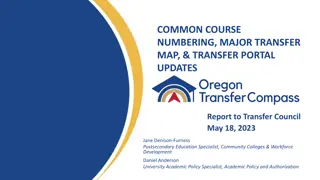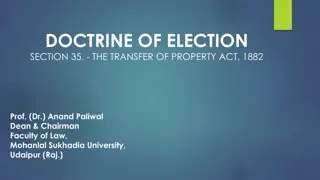Understanding Curriculum Ownership and Transfer Policies in Higher Education
Faculty ownership of curriculum involves responsibilities like determining course content, forming curriculum structure, and setting graduation requirements. Policies and procedures, usually overseen by the Faculty Senate, enable faculty ownership. Transfer credits and grades play a crucial role in university admissions, but each institution may have different policies on how they impact GPAs.
Download Presentation

Please find below an Image/Link to download the presentation.
The content on the website is provided AS IS for your information and personal use only. It may not be sold, licensed, or shared on other websites without obtaining consent from the author. Download presentation by click this link. If you encounter any issues during the download, it is possible that the publisher has removed the file from their server.
E N D
Presentation Transcript
Ownership of Curriculum UNI faculty have the responsibility for ownership of the curricuclum. Content of individual courses How courses combine to form curriculum Standards which represent graduation requirements and grades Should we claim credit / responsibility for grades from other institution
How is Faculty Ownership Enabled Policies and Procedures are codified in the academic catalog Academic catalog is the province of the faculty Specifically the Faculty Senate There exist references to other policies Probation, Honors, Graduation Requirements, etc
Current GPAs at UNI Transfer GPA: All classes taken by a student elsewhere that are accepted for graded credit by UNI. This includes # of hours and grades. No possibility for academic forgiveness. Not totally clear on how class retakes are considered? UNI cumulative GPA: All classes taken by a student at UNI for graded credit. Possibility for academic forgiveness, can appeal to retroactively withdraw from a semester, can retake courses (once) to drop a lower grade Cumulative GPA: All classes from UNI and elsewhere as ab ove, except those dropped from GPA calculations from do-overs. Major GPA: The GPA for classes explicitly listed (or listed as electives) in a given major. This includes classes taken at UNI and elsewhere, except for those dropped from GPA calculations from do-overs. In general, the UNI cumulative GPA is (not 100% positive on scholarships) applied for academic standing, scholarships, etc There exists some confusion over the distinction between cumulative GPA and UNI cumulative GPA Visited two college senate meetings and yes there is confusion among faculty as well
Transfer Credit and Grades Articulation agreements at state level determine much of how classes transfer Note: This is for university credit, NOT a given major, minor, etc Departments determine if a transfer course applies to their major and can choose to do so as they see fit, including if a class can serve a suitable pre-requisite There is no state level agreement on how grades earned elsewhere are to be used at UNI
Principles of Transfer Credit https://admissions.uni.edu/transfer/credit-faq Q: Will my grade point average transfer with me? Your cumulative transfer grade point average is used for purposes of admission to the University and advisement for your first term enrollment at UNI. Your UNI transcript will record your cumulative transfer GPA, your UNI GPA, and your cumulative GPA of all work attempted at this university and elsewhere. Transfer credit and grades are important for admission requirements and setting a baseline performance level, but we only really judge work performed at UNI and that should be where we set our standards and evaluations. ISU: Transfer credit is not used at all for GPA calculation Iowa: varies by college, CLAS college has up to 4 GPAs, which is similar to UNI https://admissions.uiowa.edu/undergraduate-programs/transfer-policies https://clas.uiowa.edu/students/handbook/grading-system https://www.registrar.iastate.edu/students/transfercredit
Issues with Standards UNI students can replace the grade of a UNI course with one taken elsewhere as long as credit transfers Bypasses UNI standards Not the case for IU or ISU Cumulative GPA includes all sources No control over standards elsewhere Encouraging some population of students to take easiest route / boost GPA by finding easiest class Discourages students from enrolling in UNI courses, especially summer classes Example: See enrollment in General Physics I before and after Hawkeye terminated their only physics instructor
Scholarships and Perception University level scholarships are prestigious and money is finite Who should maintain scholarship? Student with a high UNI GPA or student with a GPA boosted by finding an easier course elsewhere? Could that money be better served by assisting/recruiting another student? At the moment websites state scholarships are maintained by college or cumulative GPA, which includes all sources of grades
Now: No Forgiveness UNI has zero control over grades given at other institutions and also has no control over academic forgiveness policies At UNI students have access to academic forgiveness and other routes such as requesting a retroactive waiver for an entire semester Currently, the cumulative GPA includes all non-repeated courses from everywhere and students have no recourse after being saddled with a poor performance. Why should students be penalized for grades earned elsewhere? We don t know the circumstances, the issues involved, anything at all.
Recognition of Work Elsewhere Making credit and not grades transfer imposes no judgement on work done elsewhere ISU does not transfer grades, they have zero problems attracting transfer students How many at-risk students might actually benefit from a fresh start and be able to prove themselves at UNI as opposed to also trying to overcome the past? The students records would remain, nothing hidden, UNI simply would not take responsibility or credit for work done outside of UNI.
Recording Not transferring in grades for the purpose of calculating a cumulative average does NOT mean transfer grades can NEVER be used External agencies can choose what GPA they wish to consider College and departments can choose how they wish to determine awards, entrance, etc Transfer grades are recorded, just not used to calculate a cumulative GPA from UNI University level issues scholarships, probations, minimum graduation requirements as set by university should not rely on transfer grades
Issue regarding Retaking a Course Unlike ISU or Iowa, at UNI a student can re-take a UNI course at another institution and not only receive credit but also improve their cumulative GPA. ISU does not import transfer GPA and Iowa does not allow courses taken at Iowa to be repeated elsewhere as a do-over Grade Index In determining a student's cumulative grade index, all course work attempted at this university shall be used as the basis of computation with the following exceptions for students enrolled as undergraduates. If a student repeats successfully a course s(he) has previously failed, only the grade received for the successful completion will be included in figuring the cumulative grade point. If a student repeats a course s(he) has successfully completed, the grade received the last time the student takes the course will be used in figuring the grade index even though the last grade may be lower than the grade received previously. The student's transcript of record will show every time the course is taken and the grade earned. Post-baccalaureate students as undergraduates enrolled for work to meet requirements for certification as elementary or secondary teachers are given the same grade index advantage as is given undergraduate students for courses repeated. This applies only to those courses required for certification. If a graduate student repeats a course, both grades count in computing the index. Failed Courses A course taken at UNI in an on-campus setting, online, or through Guided Independent Study, which was failed, may be repeated in any of those settings. A UNI course which was failed may be repeated at another accredited college or university as long as the course has been determined and approved to be an equivalent to the original course.
Student Feedback from NSG A couple students felt this might be beneficial. These students cited: Not knowing the ramifications of performing poorly in college courses while in high school Not getting a "fresh start" upon coming to UNI More students gave the following concerns: "Coasting Problem". Students can take difficult classes at another institution-like managerial accounting-get a poor but passing grade, and then just transfer it in as "credit". If abused, student's GPA would only reflect the easier classes they took in their college career. The accounting department in no way has to accept managerial accounting for transfer credit. This would stop the practice of boosting GPA by taking easy courses elsewhere Majors could set a minimum grade for transfer credit [i.e. C] so that minimum effort does not lead even to credit Students who are unsuccessful at UNI at times use the transfer system to go to community college to salvage their GPA before returning to UNI. This would their capacity to do so. Students have many methods for salvaging their GPA . Medical or other issues can be salvaged through retroactively waiving an entire semester Classes can be retaken at UNI as many times as a student likes to eliminate an earlier poor grade (more times to average them) IS it adivisable to incentivize avoiding UNI standards for UINI students? GPA would no longer be representative of full academic experience/GPA would be warped. A student that performed poorly in their first two years of college, and then transferred those in, and then performed well at UNI would graduate with the same GPA as a student who performed strongly for all 4 years. There is a sentiment that this isn't equitable (Though I did point out it is difficult for UNI to "vouch" for any academic programs other than itself. Is an "A" understanding of Intro to Sociology at UNI the same as an "A" understanding of Intro to Soc at Iowa State? We can't really say). Transfer GPA would still be recorded, and transcripts from all institutions may be requested by any employer/graduate school, etc . The student in question would still have a transcript which recorded all the poor grades, they just would not be included as part of their UNI grades Students gave the following possible solutions: Let the student decide whether to count it as credit or a grade (this would cause gaming of the system in my opinion) This sounds awful Simply clarify and simplify the difference between UNI/Cumulative GPA. This might include simply setting a cross-campus standard (i.e. for academic issues like probation, scholarships, and graduation the UNI GPA will exclusively be used). This seems like it could be a communication issue rather than a policy issue This is fundamental. Also , the record of transfer GPA would be kept, just not used to represents the student s experience at UNI.
Feedback from Transfer Council UNI GPA is already the only measure used to determine academic standing at the university, including alert, probation, and suspension. Fact 1 in this docket item incorrectly states that cumulative GPA is used to determine whether students are placed on academic probation. There needs to be some cleanup on some UNI websites for this to be really true. Also graduation requirements for some majors include a major gpa. This major gpa currently includes grades from courses taken elsewhere. Cumulative GPA is used as a placeholder for UNI GPA for new students in the scholarship process. According to the University Registrar, scholarship administrators already have the option to use the total cumulative GPA or the UNI cumulative GPA. This gives academic departments and donors discretion in making scholarship decisions. However, if students do not have a GPA when they enter UNI, they will have an N/A GPA on scholarship applications, which will disqualify them from consideration. Scholarship applications from students before they are accepted at UNI obviously use transfer GPA. After one term they have a UNI GPA. It s not clear where that might be an issue. Also this policy would apply to university level policies, obviously it has no impact on foundation scholarships, external accreditation, or decisions made by infividual departments or colleges if they so wish to include transfer grades. Transfer students are more diverse than our direct from high school population, in terms of race, ethnicity, veteran status, and socioeconomic status. This decision would disproportionately affect minoritized students and work against our diversity and inclusion goals. I strongly disagree with the implications of this statement. Currently students in this category can be permanently crippled academically by a single poor performance. UNI has no control over academic remediation policies at other schools. Blindly using cumulative GPA as it is currently defined means students have no means to ever recover from poor academics even if it occcured decades ago. This is actually my principle argument for why cumulative GPA as it is currently defined is NOT an appropriate means for evaluating UNI students.
Feedback from Transfer Council The UNI Transfer Council has spent a large amount of time building outreach and seeking to improve relationships with the community colleges across the state. This move would damage community college relationships, essentially indicating that we do not value their courses at UNI. Not using transfer grades in determining a cumulative GPA in no way undermines relationships with community colleges or other institutions. ISU does not accept transfer GPA and they have no issue attracting transfer students. Instead, we are simply saying we have no opinon on the quality of credit earned elsewhere. We report it as a transfer GPA, maintain transcript records, and do not claim credit earned elsewhere to be part of the UNI experience. Instead we only claim credit and responsibility for coursework performed at UNI. Cumulative GPA is used for admission into certain colleges. Eliminating transfer GPA in the cumulative GPA calculations would delay admission into these colleges. In addition, faculty and academic advisors in these colleges find that students transfer GPA contributes positively to students meeting graduation GPA and internship requirements. Removing the option of including transfer GPA in these college and department-level decisions will result in students experiencing delays in registration in certain major courses and would ultimately impact time to degree. Colleges and departments are free to choose what they use as entrance requirements. This has no bearing on that at all. The wording here implies that students benefit from taking easier courses elsewhere and avoiding UNI standards for a given course in order to meet graduation requirements. I believe this mentality is instead damaging to the reputation of UNI and our students and that we should not base our own standards on work performed at other institutions. IN would recommend colleges choosing to use transfer grades take care not to discriminate based on one period of poor performance and if UNI gpa is not available yet to simply admit students based on transfer GPA on a probationary status pending their performance after 1 term or 1 year as appropriate. However, that is a decision for each department and college to best meet their needs
Feedback from Transfer Council It s unclear whether this proposal seeks to remove all types of transfer GPA from inclusion in cumulative GPA. Approximately 30% of transfer students come to UNI from four-year institutions, with our top feeders being University of Iowa, Iowa State University, and Wartburg College. As currently stated, this decision implies that we do not fully value credit from both our community college and four-year university partners. Yes I believe UNI has means of directly assessing work done at other institutions and hence should not claim to do so . ISU does not transfer in grades from UNI. This does not damage our relationship in any measureable way or mean that ISU discriminates against UNI students. It just means they don t wish to claim credit or responsibility for work performed elsewhere. In the past, the perception has been that students who transfer from community colleges do so because they are not able to obtain admission to UNI. More recent trends indicate that this is no longer the case. Students are choosing community colleges as the smart choice, not the second choice. Academically talented students are choosing to begin their education at community colleges for financial reasons, many receiving full-tuition scholarships to attend the community college for two years. This decision would penalize these students upon their arrival from their transfer destination. Students would retain a record of their transfer GPA. UNI would only claim credit and responsibliy for courses taken at UNI. However, it should be noted that attending a two year institution is not always the "smart choice". Many students find that standards at UNI are higher than those at many 2 year institutions (or other 4 year institutions) and hence start at a disadvantage compared to peers who primarily attend UNI. These students either fall behind or need to retake courses, can face an adjustment period with a relatively poor GPA, and very commonly find that it takes an extra semester or year to graduate. Or they do just fine, each student is a unique individual and it hard to make blanket statements. Regardless why is UNI claiming credit for work done elsewhere and how is this penalizing anyone?

















































